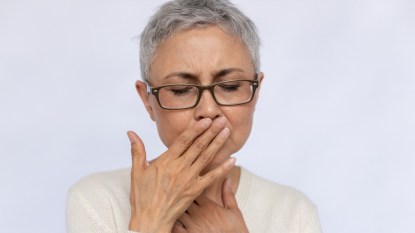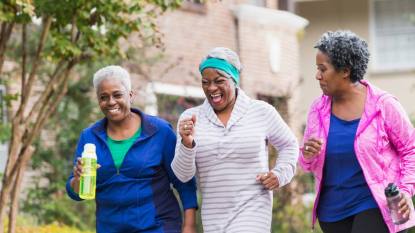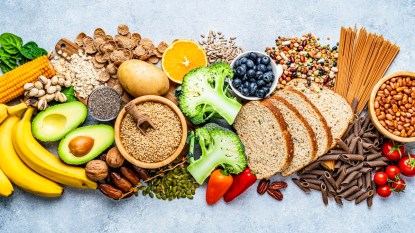How To Ease Depression After Illness + the Trick That Lifted an MD’s Spirits Post-Surgery
Giving yourself a positive pep talk may even speed healing and add years to your life

Let’s face it: Being sick or injured isn’t fun. Whether it’s a bad cold or you’re recovering from surgery, being down for the count can cause you to sink into a depression after an illness. Fortunately, there are some simple steps that can help lift your spirits. Here, doctors reveal why you may experience depression after an illness, signs it’s more than just “the blues” and how to restore your sunny mood while you’re on the mend.
Why you might have depression after an illness
It’s not uncommon to feel depressed when you’re not physically well, says Christina Lee, MD, a psychiatrist and the regional medical director of mental health at Kaiser Permanente in Baltimore. “There are a lot of factors as to why you might feel depressed while you’re sick, such as feeling unproductive, not being able to go outside, be around other people or see friends and difficulty distracting yourself from physical symptoms you’re experiencing like pain, nausea, vomiting or fatigue,” says Dr. Lee.
You’re also likely to suffer from a lack of adequate sleep while sick, while can make you feel fatigued and mentally foggy. “When you’re feeling impairments in your energy and cognition, it can also cause you to have a lack of motivation or interest in activities, and possibly result in you feeling more irritable,” Dr. Lee explains.
What else may be at play:
1. Your immune system’s working overtime
When there’s an infection or inflammation in your system, your immune system releases cytokines. These proteins tell your immune cells how to repair injuries and fight whatever’s ailing you. However, there’s a downside to this natural response. “There’s research that your immune system can cause neuroinflammation in the brain,” says Dr. Lee.
Neuroinflammation has been shown to sabotage the production and release of the “feel-good” neurotransmitters dopamine and serotonin. And when there’s a deficiency or imbalance of these natural brain chemicals, it can cause depression after an illness.

2. You had a heart attack
“Depression is experienced by about 30% of people in general, but it’s even more prevalent in patients with cardiovascular disease or who have suffered a heart attack,” says Viola Vaccarino, MD, PhD, a professor of epidemiology and medicine at Emory University School of Medicine in Atlanta, GA.
There seems to be a two-way street when it comes to heart disease and depression. “Stress and depression are risk factors for cardiovascular disease, and you see more of those risk factors in people who have had heart attack,” says Dr. Vaccarino. “However, you may see depression as a consequence of an acute inflammatory response or reaction [to the heart attack], and that surge in inflammation can make people depressed.”
Another reason you may experience post-heart attack depression is because it’s a traumatic event. “In many cases, a heart attack is near-death situation,” says Dr. Vaccarino. “Experiencing a serious trauma like that threatens your physical integrity, and that’s a strong risk factor of depression.” (Discover easy ways to reduce your risk of heart disease.)
3. You had intensive surgery
If you’ve had surgery, the recovery process can be tough and take a while. Contributing factors to post-op depression include decreased mobility, discomfort, pain and possible complications, such as developing an infection. After surgery, you may also require a stay at a hospital or rehab facility, which can up your odds of depression.
Related: New Study Links Depression and Weight Gain — Here Are 3 MD-Approved Ways to Restore Your Health
How long does depression after illness last?
In most cases, depression after an illness is temporary and subsides as you get better. “When you can return to your normal routine and get back to your lifestyle and prior activities, chances are your depression will resolve,” says Dr. Lee.
However, it’s important to know the difference between mild depression after an illness and when it’s a more serious case, says Brenna Renn, PhD, a clinical psychologist and an assistant professor in psychology at the University of Nevada, Las Vegas. “We start to get concerned when there have been a number of depressive symptoms that have occurred most of the day for more than 2 weeks,” she explains.
6 ways to ease depression after illness
While you’re on the mend, these simple strategies can help reduce feelings of depression after an illness.
1. Maintain a routine

After the first few days of being sick, try to create a routine for yourself, says Renn. “Having some structure in our day can help regulate our moods and circadian rhythms,” she says. This can be as simple as waking up at the same time, making your bed and then heading out to your patio for fresh air and sunshine post-lunch.
Sticking to a routine can not only help you feel more like yourself, repetitive routines are calming and reduce anxiety, according to a study in Neuroscience and Biobehavioral Reviews.
See also: How and Why Weighted Blankets Help to Ease Anxiety and Depression
2. Give yourself a pep talk
Sounds simple, but positive self-talk can be quite helpful while you’re convalescing, says Lori Solomon, MD, chair and clinical associate professor of family and community medicine at New York Medical College in Valhalla, NY. “Optimistic people tend to heal quicker and they live longer,” she says.
Research backs this up. A study in the Journal of Consumer Research found ill patients who focused on their future and imagined what they were going to do when they got well recovered faster and also had more energy and physical endurance.
Not sure how to get started? “Remind yourself when it comes to recovery, it’s one day at a time,” says Dr. Solomon. “Be patient and realize healing takes time.”
3. Savor scrambled eggs
Eggs are many people’s go-to when sick because they’re a light, stomach-friendly food that’s nutritious. And it turns out they can lift your spirits, too. Eggs are a good source of choline, a nutrient that helps reduce mood-dampening inflammation. Plus they contain tryptophan, an amino acid that helps increase serotonin production. They’re so helpful that a study in BMC Psychiatry found people who ate 3 or more eggs a week had a 38% lower risk of depressive symptoms.
4. Reach out to a friend

“People who tend to be the most resilient and not feel down in the dumps are people with a strong support system,” says Dr. Solomon. Though you may not initially feel like talking to anyone, it’s important not to cut yourself off from communication with others. Doing so can contribute to feelings of loneliness and may even make your physical symptoms worse.
One study in Health Psychology found cold sufferers who experienced loneliness while in quarantine were more likely to report more severe cold symptoms compared to the less-lonely group. The researchers suspect lonely individuals have poorer sleep, which may affect their response to a virus and worsen symptoms.
To keep depression after illness at bay, send a text, schedule a phone call or hop on a video chat. And when talking to your friend or loved one, don’t be shy about asking for help or taking them up on their offer to do something for you, such as grocery shop or pick up your medication. “You may feel you don’t want to burden anyone, but it’s not a burden when someone cares about you,” Dr. Soloman says. “Oftentimes they’re happy to be needed.”
5. Stroll around the block
Moving your body while you’re healing is important for both your physical and mental health. And one of the most doable activities is to take a walk, says Dr. Solomon. “After I had back surgery and couldn’t use my exercise bike, I started going out for slow walks every day for 10 minutes and went a little further every day,” she says. “It made me feel better because I was getting up and doing something active.”
Getting out for a walk improves blood flow, boosts the immune system and even speeds wound healing, says Dr. Solomon. If walking feels daunting right now, Dr. Solomon suggests trying other types of movement such as chair yoga, gentle stretching or lifting light weights while you’re watching TV.
See also: Why Low-Impact Exercise May Be the Secret to Easing Depression
6. Cue up a comedy
Laughter can really be the best medicine. Simply tuning into a rom-com, episodes of your favorite sitcom or watching funny pet videos on YouTube can help get you out of the doldrums. “It’s a great distraction, especially if you feel as if you’re wallowing in the misery of being sick,” says Dr. Lee. “Laughing also releases endorphins, and those feel-good brain chemicals help relieve pain and stress.”
Need inspiration? Melissa McCarthy Movies: 9 Films That Will Knock Your Socks Off (with Laughter)
For more ways to combat depression and it’s related health effects:
How and Why Weighted Blankets Help to Ease Anxiety and Depression
New Study Links Depression and Weight Gain — Here Are 3 MD-Approved Ways to Restore Your Health
This content is not a substitute for professional medical advice or diagnosis. Always consult your physician before pursuing any treatment plan.













